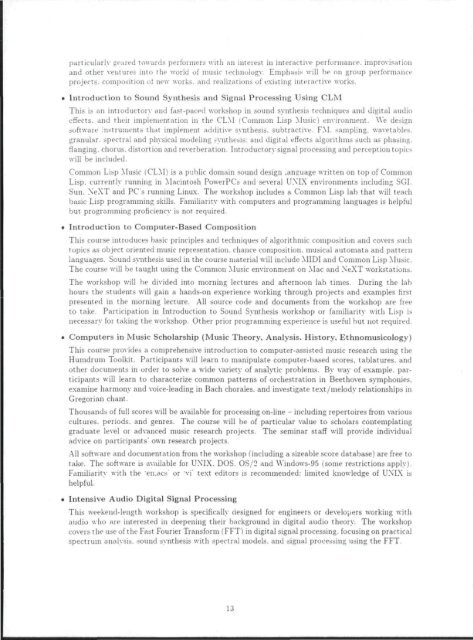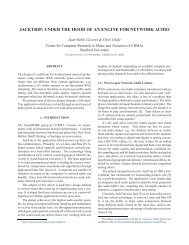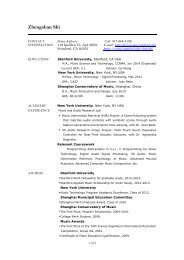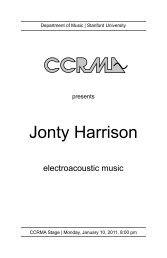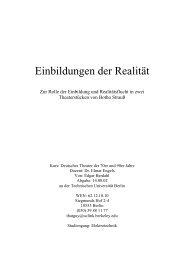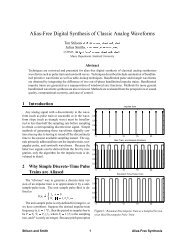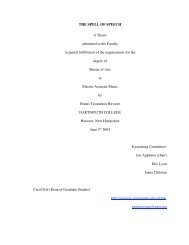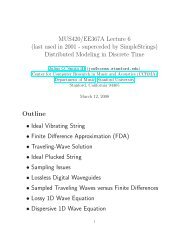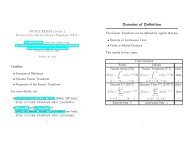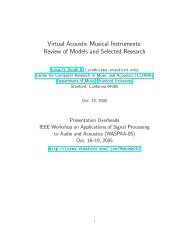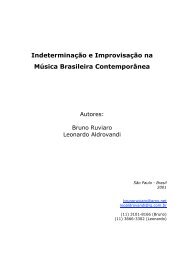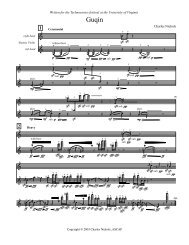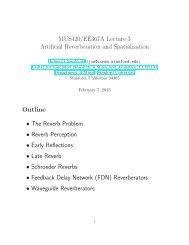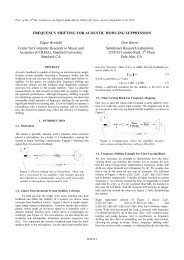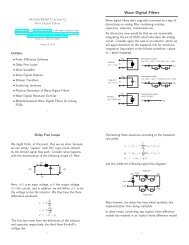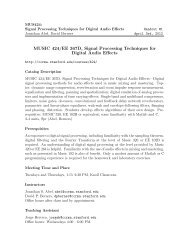Download - CCRMA - Stanford University
Download - CCRMA - Stanford University
Download - CCRMA - Stanford University
Create successful ePaper yourself
Turn your PDF publications into a flip-book with our unique Google optimized e-Paper software.
particularly geared towards performers with an interest in interactive performance, improvisation<br />
and other ventures into the world of music technology. Emphasis will be on group performance<br />
projects, composition ol new works, and realizations of existing interactive works.<br />
• Introduction to Sound Synthesis and Signal Processing Using CLM<br />
This is an introductory and fast-paced workshop in sound synthesis techniques and digital audio<br />
effects, and theii implementation in the CLM (Common Lisp Music) environment. We design<br />
software Instruments that implement additive synthesis, subtractive. FM. sampling, wavetables.<br />
granular, spectral and physical modeling synthesis: and digital effects algorithms such as phasinji.<br />
Hanging, chorus, distortion and reverberation. Introductory signal processing and perception topics<br />
will be included.<br />
Common Lisp Music (CLM) is a public domain sound design .ansuage written on top of Common<br />
Lisp, currently running in Macintosh PowerPCs and several UNIX environments including SGI.<br />
Sun. XeXT and PC's running Linux. The workshop includes a Common Lisp lab that will teach<br />
basic Lisp programming skills. Familiarity with computers and programming languages is helpful<br />
but programming proficiency is not required.<br />
• Introduction to Computer-Based Composition<br />
This course introduces basic principles and techniques of algorithmic composition and covers such<br />
topics as object oriented music representation, chance composition, musical automata and pattern<br />
languages. Sound synthesis used in the course material will include MIDI and Common Lisp Music.<br />
The course will be taught using the Common Music environment on Mac and XeXT workstations.<br />
The workshop will be divided into morning lectures and afternoon lab times. During the lab<br />
hours the students will gain a hands-on experience working through projects and examples first<br />
presented in the morning lecture. All source code and documents from the workshop are free<br />
to take. Participation in Introduction to Sound Synthesis workshop or familiarity with Lisp is<br />
necessary for taking the workshop. Other prior programming experience is useful but not required.<br />
• Computers in Music Scholarship (Music Theory, Analysis. History, Ethnomusicology)<br />
This course provides a comprehensive introduction to computer-assisted music research using the<br />
Humdrum Toolkit. Participants will learn to manipulate computer-based scores, tablatures. and<br />
other documents in order to solve a wide variety of analytic problems. By way of example, participants<br />
will learn to characterize common patterns of orchestration in Beethoven symphonies,<br />
examine harmony and voice-leading in Bach chorales, and investigate text/melody relationships in<br />
Gregorian chant.<br />
Thousands of full scores will be available for processing on-line - including repertoires from various<br />
cultures, periods, and genres. The course will be of particular value to scholars contemplating<br />
graduate level or advanced music research projects. The seminar staff will provide individual<br />
advice on participants' own research projects.<br />
All software and documentation from the workshop (including a sizeable score database) are free to<br />
take. The software is available for UNIX. DOS. OS/2 and YVindows-95 (some restrictions apply).<br />
Familiarity with the en.acs' or 'v'l text editors is recommended: limited knowledge of UNIX is<br />
helpful.<br />
• Intensive Audio Digital Signal Processing<br />
This weekend-length workshop is specifically designed for engineers or developers working with<br />
audio who are interested in deepening their background in digital audio theory. The workshop<br />
covers the use of the Fast Fourier Transform (FFT) in digital signal processing, focusing on practical<br />
spectrum analysis, sound synthesis with spectral models, and signal processing using the FFT.<br />
13


